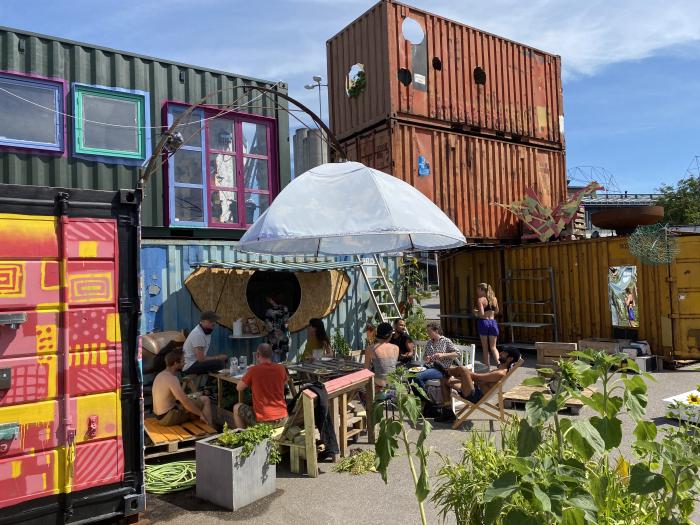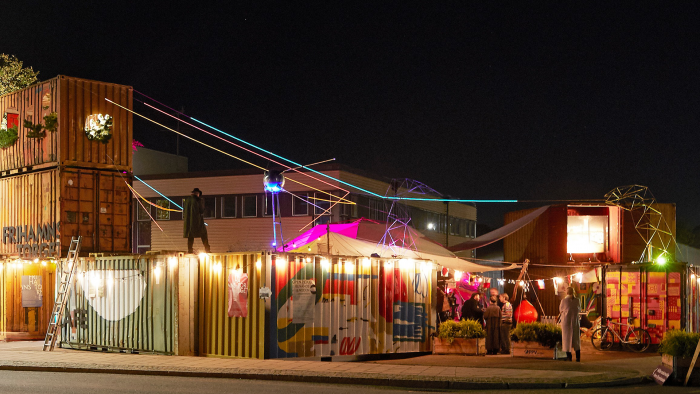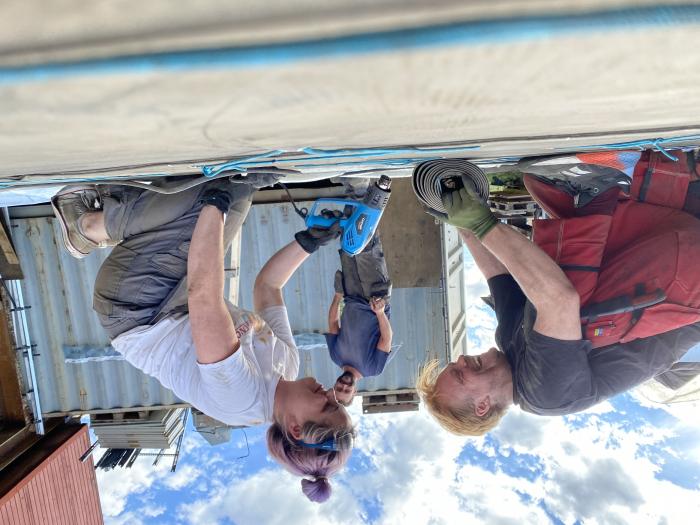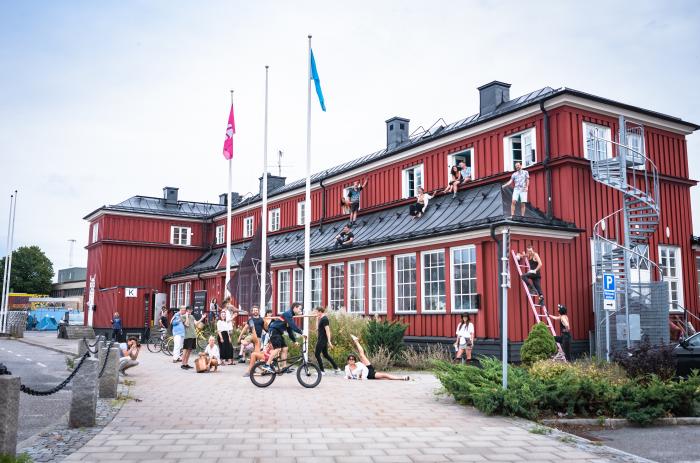I. SUMMARY INFORMATION
Project
269037
Status
Submitted
Award category
Reinvented places to meet and share
You want to submit
NEW EUROPEAN BAUHAUS AWARDS : existing completed examples
Project title
Frihamnstorget - An Urban Village
Full project title
Frihamnstorget - Building an Urban Village through Participatory Placemaking
Description
Frihamnstorget is a co-created container park in the middle of urban Stockholm, where grassroot initiatives, crafts, artists, events and culture meet in a participatory re-shaping of the cityscape. This is a true ”third space” –, neither fully private nor public, curated and maintained by its members, and created by the users. Everything that takes place here is done so according to the dreams of the people participating in its creation. We empower citizens to create their desired reality.
Where was your project implemented in the EU?
Sweden
Stockholm
Södra Hamnvägen 5
9°20'34.4"N
18°07'02.5"E
Stockholm
115 28
When was your project implemented?
Has your project benefited from EU programmes or funds?
No
Which programme(s) or fund(s)? Provide the name of the programme(s)/fund(s), the strand/action line as relevant and the year.
II. DESCRIPTION OF THE PROJECT
Please provide a summary of your project
Frihamnstorget (FT) is a co-created container park in the middle of urban Stockholm, where grassroot initiatives, craft, art, creativity, events and culture meet in a participatory re-shaping of the cityscape. Through a truly participatory ethos, we have reshaped a parking lot into a communal square, where the users are the ones who make all the decisions. The concept is built on a participatory design where anyone is welcome to join the co-creation of the space, and where respect and responsibility is nurtured in a dynamic and ever growing community. FT has become a home to a diverse group of creatives and professionals, from plumbers and welders to developers and scenographers. Grassroots movements like Precious Plastic, Nordic Ocean Watch and Stockholm Foodsharing are naturally attracted to FT and are finding their home among the up-cycled containers.
FT blurs the boundaries between professional and amateur, and between participants and audience. This, in turn, opens up for an interdiciplinary cross-pollination among our members and visitors. In such a context, unlikely alliances can form that lead to innovative problem solving such as the development of new features in machines and formation of creative businesses using recycled materials.
Coming to FT feels like moving into a friendly town. You are immediately invited to truly participate and nobody is asking you to buy anything to be allowed to stay. An example of this is the re-occuring event “Work Is Play”, where people are invited to spend the day on the square to co-create existing and new projects and learn useful skills from all our talented members.
FT not only encourages citizen initiatives but is currently funding projects that can be initiated by the public. We use our own digital service for citizen-driven placemaking called Plato (Placemaking Tools). The platform supports FT in questioning established principles of city planning and placemaking in Sweden today.
Please give information about the key objectives of your project in terms of sustainability and how these have been met
Frihamnstorget (FT) aspires to change the way city spaces are created and used, in a way that changes the view of the users of the space as consumers, into a perspective where the citizens are participants in their own rights. Sustainability and beauty is not something that is posthumously added on this process, as is often the case in city planning. Rather, it’s implemented as one of the foundational parts of the project. At FT, the needs, dreams and initiatives of the users of the space are the only ruling principle for what will be built and planned.
FT is situated in an old industrial area and are among the first cultural actants inhabiting the area, with a clear objective to work together with local residents, the community around our establishment and the neighboring enterprises to re-shape the space into something dynamic, ever-growing and beautiful.
As such, FT is very much aware of the UN Sustainable Development goals. For example, goal 11, ”Sustainable Cities and Communities'', and goal 12, ”Responsible Consumption and Production”, are naturally implemented in the core concept of the project. FT uses up-cycled old shipping containers that are custom produced to the specific need of the owner, to create a form of modulated space that is easily reshaped over the years. One container might contain a fully equipped kitchen to use as a restaurant or coffee place, another might contain a conceptual art project, and yet another might be re-built into a common sauna. The framework material is reused, and the whole structure of the place is always re-written.
The content of the place is shaped by the users of the place, and as such, FT nourishes a community of responsibility and respect. For example, the space has as active members people who work with projects such as ”Precious Plastic”, an educational platform and micro-manufacturing unit that recycles plastic trash into raw material for creative art and design.
Please give information about the key objectives of your project in terms of aesthetics and quality of experience beyond functionality and how these have been met
Frihamnstorget (FT) is influenced by Blivande’s core value of ‘Always Becoming’. Blivande is the Swedish word for ‘becoming’ and was chosen to signify the essence of what we want to cultivate, create and observe in ourselves and society. We believe that everything including ourselves and the physical environment are in a constant state of becoming. Aesthetically, ‘Always Becoming’ means that we aspire to create with FT an experimental lab for urban aesthetics and influence the future residential area with organically changing structures and co-created cultural experiences.
The aesthetic of FT is partially inspired by the ‘Solar Punk Movement’, a future-envisioning trend that symbolized the desire to converge nature and technology, social innovation and humancentic design with urbanism and the ‘Do-It-Yourself’ attitude often seen in makers. We already have the capacity to up-cycle rusty old containers and are currently developing a program to design and produce green walls. The square already is an exuberant space actively created by its users through participatory placemaking and our own digital service Plato. FT has a unique way of establishing a sense-of-place and ownership in citizens.
Structures, projects and art at FT go beyond basic functionality and the material dimension. Members and visitors of FT experience the freedom to be able to try something new, to slowly change and organically create their physical realities. Here, people develop professionally and personally while having a network and community for support, in case a project fails.
FT is a cultural dandelion growing in the cement of an underused industrial area. Art and culture are not dictated from above, but develop as experiences and according to the needs and desires of the FT’s members. One of the many examples of art unfolding as an experience at FT is the ‘Secret Experience’, a high-end culinary performance by a resident artist duo, ‘The Toxic Twins’.
Please give information about the key objectives of your project in terms of inclusion and how these have been met
Frihamnstorget (FT) is designed to be a creative village in the city and an oasis of different independent but interdependent initiatives. What unites the activities and projects taking place here is that they are created with the intention of bringing people together, ideally reinforcing a sense of meaning in their everyday lives. We believe that participatory culture and art can help counter an ongoing crisis of lack of purpose and social isolation in urban environments.
The people at FT are part of an interdisciplinary, international community that encompasses individuals of different ages and from diverse walks of life, including academics, artisans and artists. As such, we can see that this creative environment leads both to social interactions that help people find a sense of home and togetherness, and to unexpected professional collaborations leading to new innovative projects.
FT is founded upon a sense of a dynamic community, where everyone is part of the re-shaping of the common space. As such, all events organized at FT are made by members for members and the public, and they are always based on a sense of responsibility and generosity. Generosity as a concept plays an important role in creating trust between participants and people in the city. Through trust and co-creation, it becomes possible to use resources according to ability and need, instead of using market forces as a guiding principle. Incentives are geared towards cultivating a regenerative ecosystem, priming its members to strive for collaboration and synergy rather than individualistic monetary profit.
FT is a place for everyone, and events are organized as such. We can see initiatives of art projects and hang outs for families and children, sober dance parties, after work building activities, and participatory art projects. And everything in between!
Please give information on the results/impacts achieved by your project in relation to the category you apply for
Frihamnstorget (FT) and its members have transformed an underused parking lot in prime real estate into a vibrant creative community. We have created a place in Stockholm where interdisciplinary professionals meet and develop innovative ideas and translate them into the physical environment. FT has become an inviting urban landscape that encourages the public to participate in its organic evolution in numerous ways.
The events at FT are open to the public and motivate citizens to participate or visit existing projects and incentivise them to come up with their own. This summer we are primering a new initiative that through our own placemaking software (Plato) funds citizens initiatives, art projects and events at FT. It is a decentralized and citizen-driven solution for urban placemaking.
Plato is not only used for collectively funding, developing and approving projects, it is also used to schedule the availability of existing resources in a co-created manner. An example for this is Gallery Frihamnstorget, a container gallery at FT that supports young and upcoming artists. Through the digital service Plato, applications for the gallery are not simply approved or declined, but the artist and the gallery curators are engaged in an online dialogue that often helps both parties to develop and improve the exhibition concept. This is a typical example of virtual collaboration at FT.
FT is designed to be a not-for-profit space that gives, then gets, then gives even more to everyone involved. We collaborate to develop this unique environment with important stakeholders such as Stockholm City and higher education institutions such as Stockholm University and Hyper Island. We believe that this process of co-creating a public place through citizen initiative is in itself a work of art and an experiment in serf-organization and creativity with the potential of reshaping the relationship between citizens and the city they live in.
Please explain the way citizens benefiting from or affected by the project and civil society have been involved in the project and what has been the impact of this involvement on the project
Despite public events coming to a halt during the Covid-19 pandemic, FT has continued to develop physically. The community was never dormant during the pandemic – quite the opposite. As an environment used to chaos and a degree of fluctuating structures, the community around FT proved to be resilient and creative in the face of great uncertainty and fear. For example, the agile and grass-roots-driven members organised a nationwide production of 200.000 protective gowns for healthcare workers given the sudden shortage in April 2020. This Crisis Response initiative was awarded the Civil Solidarity prize by the European Economic and Social Committee.
Civic engagement is exemplified by the participants at FT and is often mimicked by visitors. We believe that there is a vast and often tragically untapped potential in distributed and networked civil society action, and it is our hope that FT will shine a light on this fact and in doing so inspire more citizen-driven groups to step up, both in crisis and everyday life.
FT persistently keeps a door open for collaborations of any kind and hopes to interweave and connect various aspects of the human experience. The square is first and foremost made to fit the needs of the citizens involved. It is truly an example of human-centric, co-created design. We believe that the sustainable cities of tomorrow will benefit from participatory placemaking, as it gives citizens agency and ownership over the physical environment they inhabit.
The square has become a place where skills are naturally transferred from professionals to amateurs, either through dedicated courses or through the development of shared projects. These skills do not only include crafting, but project prototyping, participatory decision making and urban design. This creates an invaluable resource of engaged and autonomous citizens that strengthens society’s attitude towards urban development and resilience in times of crisis.
Please highlight the innovative character of the project
Frihamnstorget (FT) is a place of experimentation in every possible way. Our projects encompass digital placemaking tools, social values research and profitable product development with recycled materials. We call ourselves a social innovative center as we prototype a new urban way of living and design our organisational structure according to our own needs in a decentralized way. FT is a village where people work, create and socialize. Together we grow professionally and personally. Our core community consists of ca. 60 people. This core is supported by an additional 300 periphery members and 3-4.000 people in the Nordics that frequently visit FT and take part in our participatory ethos.
Market forces and profitability are never the main prospects at FT. Even though economy and gain is regarded as an important factor, mutual support and trust between peers and visitors are considered as more valuable. We have developed methods that bring us out of individualism and into a more relational way of being that fosters solidarity and creates emotional and economic reciprocity. What we see is that this perspective also fosters an innovative sense of business building that can be at the same time economically, ecologically and personally rewarding.
What makes FT truly innovative is the ongoing invitation towards the public to come and co-create the space by helping existing projects or developing new projects with the expertise and support of experienced members. We enable this process personally and digitally aspiring to create a public space where citizens and visitors feel a high sense of ownership.
Please explain how the project led to results or learnings which could be transferred to other interested parties
Frihamnstorget (FT) and its community is an experiment in stewarding and cultivating a self-sustaining ecosystem, and its goal is to develop it into a model that can be replicated. We are joined in this experiment by kindred communities around the world, with whom we collaborate both formally and informally. We develop methodologies and tools and cross-reference with other initiatives to learn and level up together.
FT is populated by a network of driven, interdisciplinary members striving for a bright, sustainable and inclusive future. We create methods and obtain learnings that are publicly shared through our forum, where frequent collaborations between other citizen-driven organizations occur.
In alignment with regenerative theories, FT is not intended to grow indefinitely. Rather destined to grow until it has the innate capacity to replicate itself in other areas of Stockholm and ultimately Sweden. This not only enables a slow and organic development but safeguards the relational intimacy that is needed for participants to form lasting bonds and trust. We envision a future where multiple intimate urban villages co-exist within a larger urban context.
An example of how FT is in a steady process of dissemination is the current Projekt Colonia, where Blivande, together with a real estate company (ByggVesta), is planning and building a square connected to the campus area at Linköping University. The square will be built with FT as an explicit example, with the student involvement as an integrated and foundational part of all levels of the planning and building of the space.
We have observed in the past few years, how an empowered and creative group of citizens formed around a physical space and symbiotically started working on forming their individual relaties together. The processes involved in making this happen are already spreading and forming similar spaces all around Europe.
Is an evaluation report or any relevant independent evaluation source available?
No
III. UPLOAD PICTURES
IV. VALIDATION
By ticking this box, you declare that all the information provided in this form is factually correct, that the proposed project has not been proposed for the Awards more than once under the same category and that it has not been subject to any type of investigation, which could lead to a financial correction because of irregularities or fraud.
Yes



